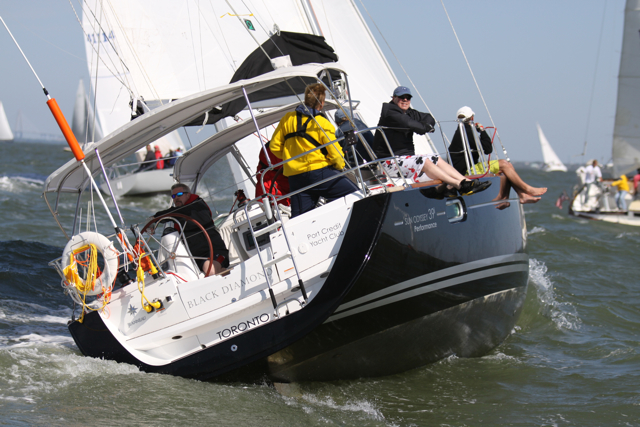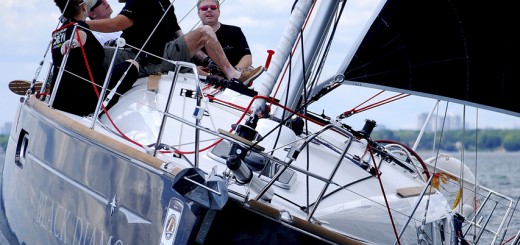Sailboat Refuelled by Russian Oil Tanker, 235 miles offshore in the Mid-Atlantic
Once the weather mostly subsided, what was left was a lighter breeze and 6 to 10-foot swells. We had difficulty making good seaway towards Newport Rhode Island, as it was upwind and pushing through the swells on the bow. At times we were actually being pushed further and further offshore. We have been sailing during this entire 9 day adventure, only running our engine for the purposes of charging our batteries, which provided power to the refrigeration, freezer, electronics and communications systems. At this point we had about a 1/4 tank of fuel left and thought it prudent to refuel somehow before we completely ran out of fuel.
We carry a SAT phone on our ocean passages. My wife Roxane is our land crew, who is continuously updating us on conditions and weather forecasts even though we have live Sirius weather on board Black Diamond. We made a call to Roxane and asked her to reach the coast guard for us. Making calls, and sitting on hold while on a SAT phone is not as easy as it sounds. It doesn’t act like a cell phone, and you often lose the signal, and can’t be on hold very long. So its a good idea to have land crew make the call, and set up the emergency ticket. This way they can you directly and you’ll be speaking to the actually dispatch that can help you. We called Roxane at 4am, knowing this might take awhile, and wanted to do this during day light hours.
It took her almost 3 hours, after being told to call various coastguard offices before one was willing to help us. When she first called, they asked where is she calling from, and since we are Canadians, they asked us to call the Buffalo New York station, regardless of where the boat was. Then she was told to call New England, and Newport our destination. Then finally after realizing the actually GPS lat & long coordinances, they realized we were closest to the Long Island, NY station. Which is the one that ended up helping us. What also made things much easier, was we have a SPOT GPS locator on board, we will use this to send our location out manually every 6-12 hours. It is posted directly to this website on our blog page, which is only active when we are using this service. But in case of emergencies, we set up the SPOT so it sends our location out automatically every 5 mins. We had it doing this during these calls to the Coastguard.
We had it doing this during these calls to the Coastguard. The Coast was able to see in real time where we were at all times, and which direction we were heading and at what speed. So when we were on the SAT phone, we didn’t even have to give our coordinates. During this same storm Ana, 5 boats had either sank or went missing and sadly there were casualties. At first the Coastguard thought we may be in a serious situation and even offered a helicopter lift for crew if we felt the vessel was in danger. Apparently it is entirely up to the Captain of the vessel, which would be me if we wanted an air-lift, it doesn’t really matter what the conditions are like or the status of our vessel. They went over the status of the boat and crew, if everything was in order, with vessel and crew, our engines, sail conditions etc. They determined we only needed fuel, asked if we need food and water also.
We started this call with Roxane at 4am, started speaking to the Coastguard ourselves at 7-8am. They had a Russian Oil Tanker diverted to us immediately and by about 3-4PM we were getting refueled. Good think I thought to start this at 4am.
In the old days things didn’t go as smoothly, first of all, No GPS, No SPOT, No Sat Phones, and No AIS. AIS actually played a huge roll is this. The coastguard is able to see all the commercial traffic, their speed and heading, and their destination. They make a call to that vessel, and ask them, but really tell them to come to our rescue. They can’t really refuse. In the old days, the Coastguard would not know who was available, and would simply make a blanket call out on the radio, and many vessels on schedules, would not bother to answer the call, thinking someone else will do it or and some would not be truthful about their location etc. Now they don’t even volunteer but are told to do this, mariners international law. They can only refuse if it would cause danger to their own vessel or crew.
In any case, this is just a side-bar for your interest. We are very thankful to the Captain and crew of our Russian Oil Tanker Mariposa. They were definitely professional seamen and women, and very kind to help us out the way they did.
See below for the actual video footage, and below this video frame, see the conclusion of this episode.
After our, we received our fuel, and Mariposa was on her way, they told us that we need to call the coastguard and report that we received our fuel. We failed to do that immediately, as it was not so simple to get a signal and make the call on the SAT phone. We thought we better get this fuel in the boat and once we are heading toward Newport we could make that call.
We set the boat to Autopilot, and had her drifting down-wind with the waves as stable as we could. We rigged up a system to refuel, meanwhile, the boat was just drifting at 1-2 knots with the swells. Perfect for refueling the jugs.
Meanwhile, Mariposa had left, and all the Coastguard could see our SPOT GPS location, pinging that we were at drift with the wave action at 1-2 knots. The Coastguard was very worried that we had been damaged by the tanker, and that maybe the tanker had taken off and left us there. They called my wife Roxane, to see if she was in contact with us, and she wasn’t either. So there was a bit of a panic until we called to report in. Apparently, all kinds of things happen at sea, so they were taking precautions and would not simply believe the tanker that everything was fine.
Thankful to the good men and women at the Coastguard and for all they do!
Once we were refueled and on our way, we made to Newport Rhode Island in about 36 hours, and 2 days to spare before the Newport Volvo Ocean, in-port races. Black Diamond was Spectator boat during this, watch for more videos and content to come.



Everything in this video is true 🙂 i can swear on it 🙂
hope you guys paid the russian tanker back for the fuel and diversion and also sent a box of chocolates to the crew.